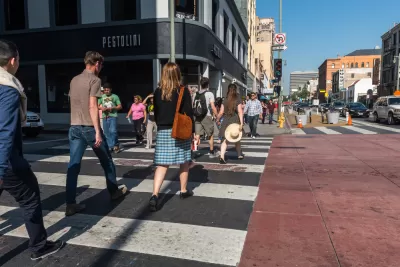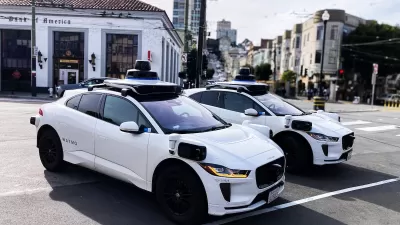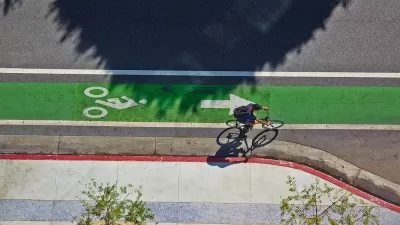A legacy of discriminatory planning exacerbated the low-density sprawl that's been so hard for Los Angeles to roll back.

The Los Angeles stereotype is insane commutes and unwalkable streets. The stereotype is not completely unfounded, because of when the city was growing. "Social inequality is baked into the regional land use laws characterized by low-density sprawl that has contributed to car dependence," Emily Han writes for The American Prospect. The sprawl makes it particularly hard to grow public transit. "Long distances between home and work complicate walking and biking, while the absence of a high-frequency transit network also encourages driving," Han writes.
But many are looking to change that reality. "A walkable city means building more workforce housing, a robust bike network, and reliable transit that puts homes and employment in closer proximity," Han writes. Some road diets have been put in to slow drivers, but they've faced serious opposition, "despite the fact that road diets reduce fatalities, these projects have also generated considerable political controversy."
FULL STORY: The Continuing Quest for a More Walkable Los Angeles

Maui's Vacation Rental Debate Turns Ugly
Verbal attacks, misinformation campaigns and fistfights plague a high-stakes debate to convert thousands of vacation rentals into long-term housing.

Planetizen Federal Action Tracker
A weekly monitor of how Trump’s orders and actions are impacting planners and planning in America.

In Urban Planning, AI Prompting Could be the New Design Thinking
Creativity has long been key to great urban design. What if we see AI as our new creative partner?

King County Supportive Housing Program Offers Hope for Unhoused Residents
The county is taking a ‘Housing First’ approach that prioritizes getting people into housing, then offering wraparound supportive services.

Researchers Use AI to Get Clearer Picture of US Housing
Analysts are using artificial intelligence to supercharge their research by allowing them to comb through data faster. Though these AI tools can be error prone, they save time and housing researchers are optimistic about the future.

Making Shared Micromobility More Inclusive
Cities and shared mobility system operators can do more to include people with disabilities in planning and operations, per a new report.
Urban Design for Planners 1: Software Tools
This six-course series explores essential urban design concepts using open source software and equips planners with the tools they need to participate fully in the urban design process.
Planning for Universal Design
Learn the tools for implementing Universal Design in planning regulations.
planning NEXT
Appalachian Highlands Housing Partners
Mpact (founded as Rail~Volution)
City of Camden Redevelopment Agency
City of Astoria
City of Portland
City of Laramie





























